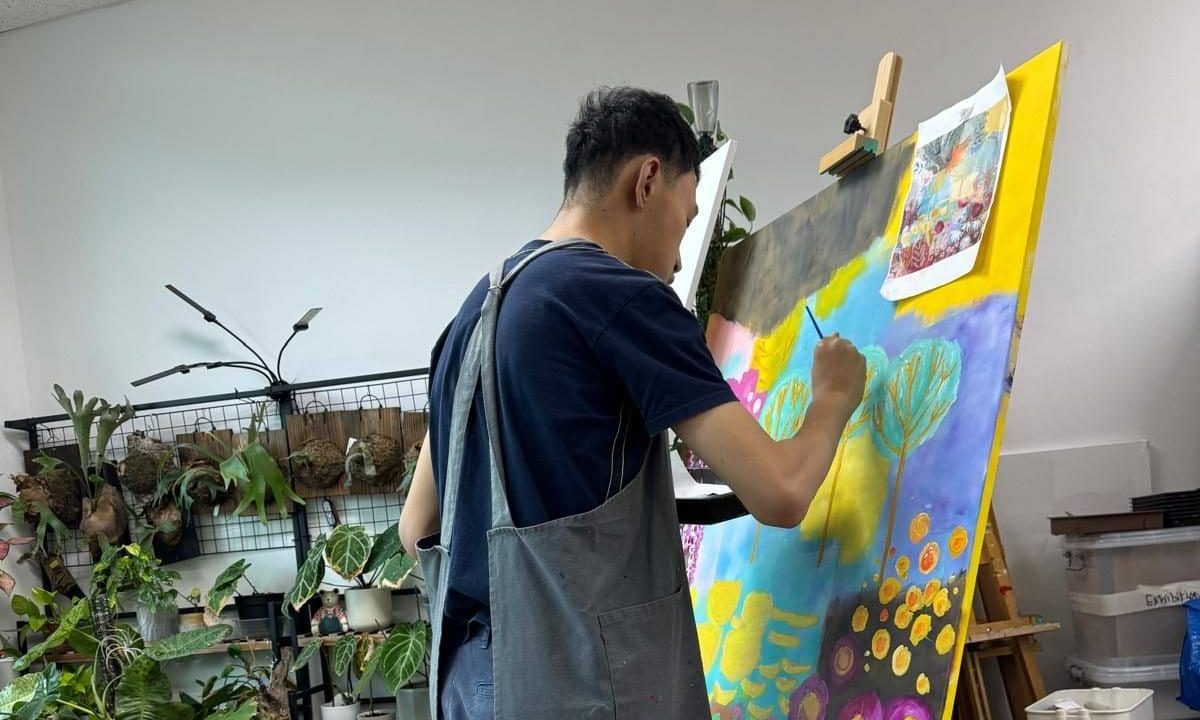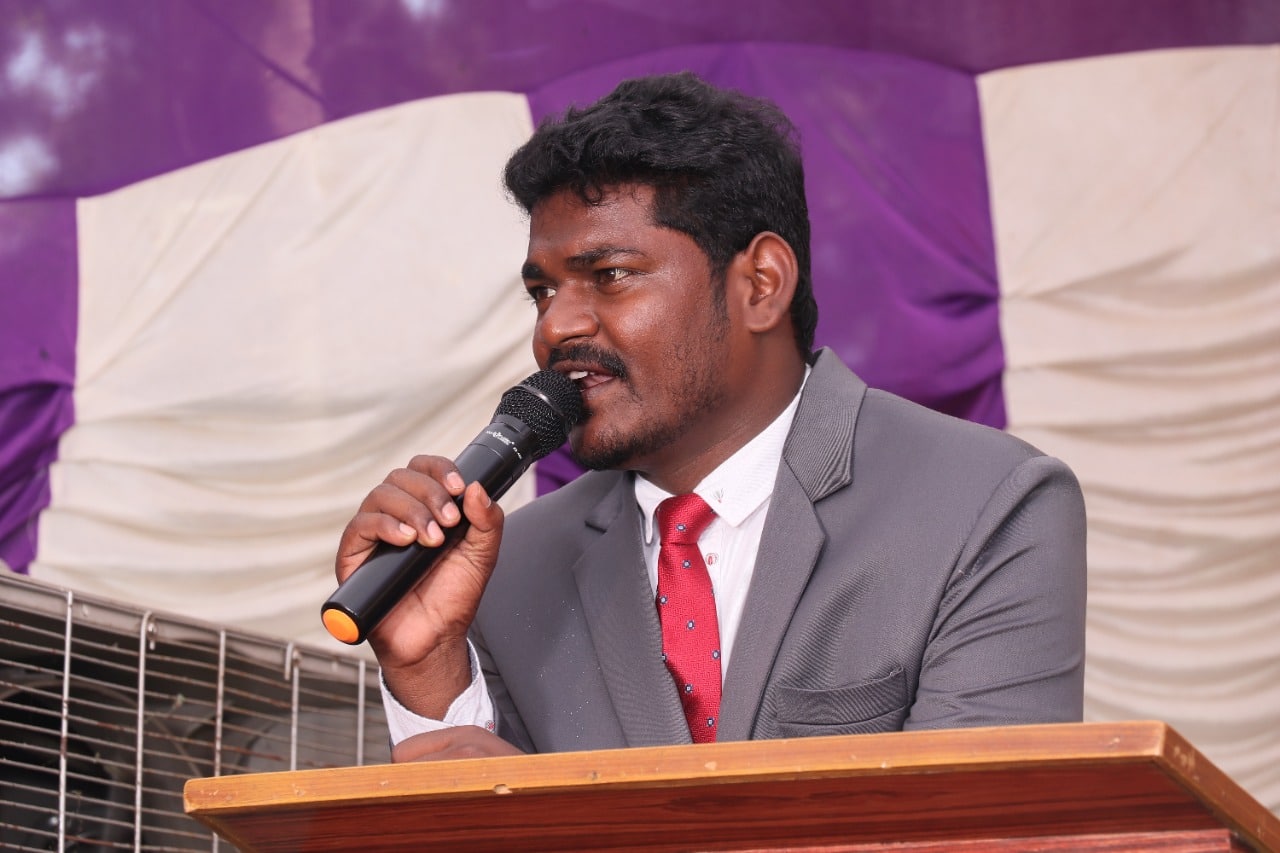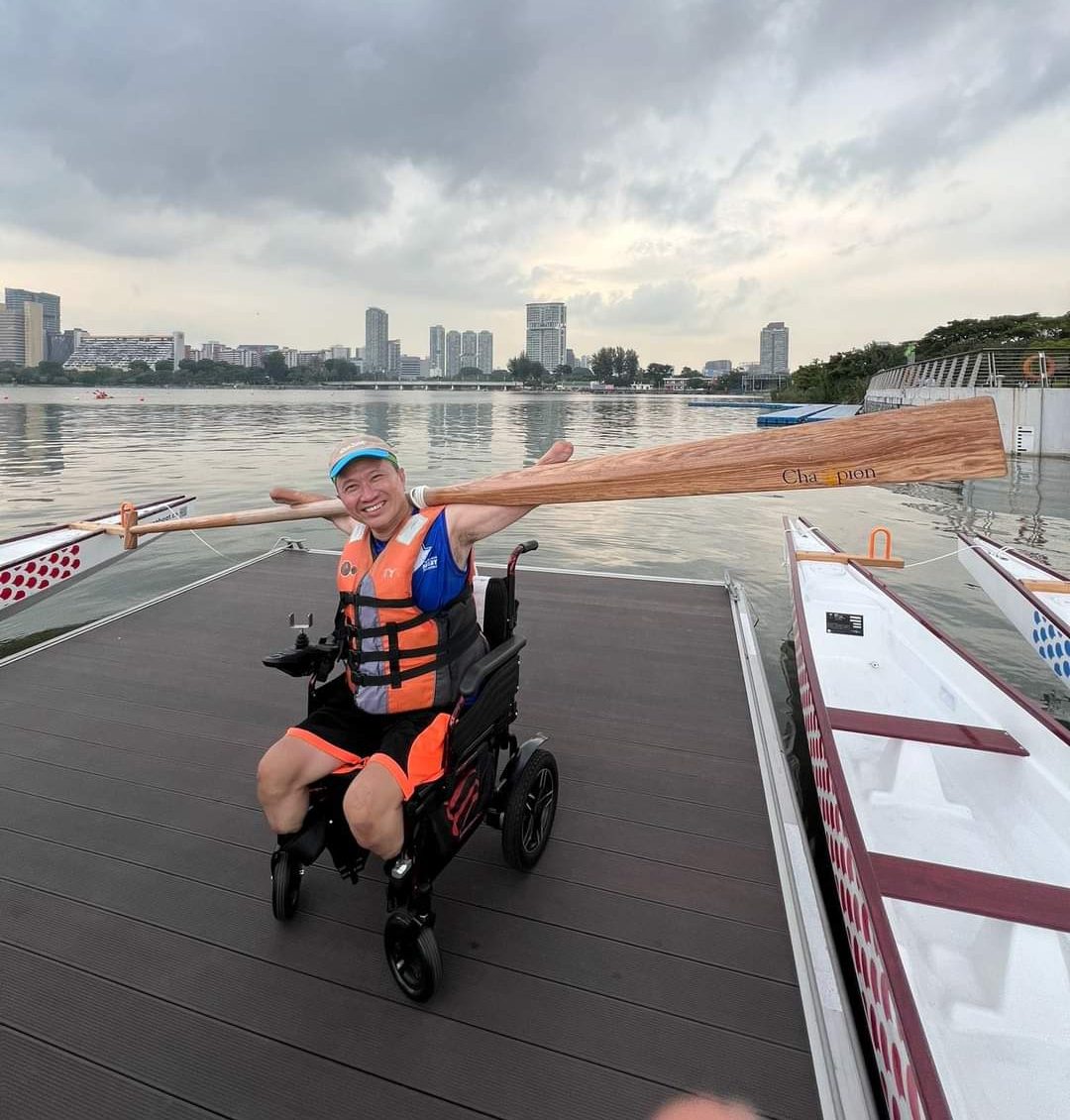“God did not make us independent; He made us interdependent”: Embracing those with disabilities as Kin
by Gracia Lee // June 25, 2021, 6:46 pm

Koinonia Inclusion Network, or KIN, is built on the firm conviction that people with disabilities are not burdens or inconveniences, but valuable individuals who are integral to the Church, said president Leow Wen Pin. Photo courtesy of Leow Wen Pin.
He knew he had not done a good job at preaching that Sunday morning.
As Leow Wen Pin shook the hands of leaving worshippers at the end of the service, he tried to put on a smile even though he felt deeply ashamed and discouraged.
As the congregants filed out of the sanctuary, a woman with an intellectual disability stopped to talk to him, as she did every week.
“I gave you pens. You gave me dignity as a preacher. I need you more than you need me.”
It was her habit to ask him for a pen, and he would willingly oblige each time.
It was just a routine interaction they had developed after he had struck up a casual friendship with her one Sunday. She had been alone after service and he had gone to talk to her “a bit out of pity”, said Leow, who is currently a lay pastor at Singapore Life Church.
This time, however, the woman did not make her usual request for a pen. Instead, she told him: “I love it when you preach. Look, I took notes.”
Opening her notebook, she revealed a page of words scribbled in child-like handwriting. They were the main points that Leow had made in his sermon.
Choking up with emotion as he recounted the story, the 38-year-old told Salt&Light: “I thought to myself, ‘I gave you pens. You gave me dignity as a preacher and reminded me why I’m doing what I’m doing. I need you more than you need me.’”
A stronger Church
This interaction is just one of many that has cemented in Leow a firm conviction that people with disabilities are not burdens or inconveniences, but valuable individuals who are integral to the Church.
This belief lies at the very heart of Koinonia Inclusion Network, or KIN, a Christian non-profit he set up in 2019. It aims to educate, equip and train Christian communities in Singapore to better embrace persons with disabilities, believing that the Church will be stronger for it.
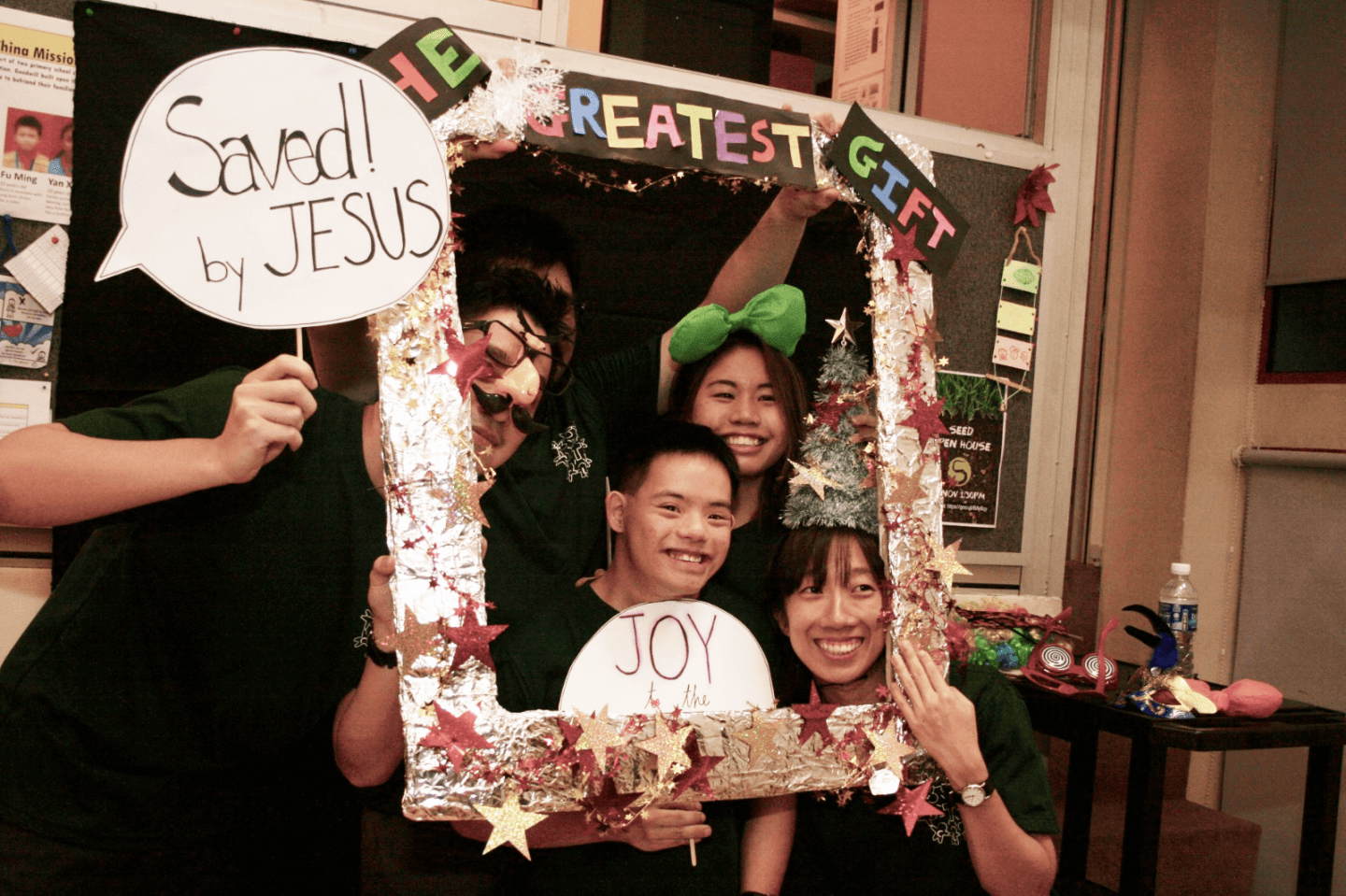
It is only when we accept and embrace persons with disabilities that the Church can grow into the kind of Church God wants it to be, said Leow. Pictured here are members of Jesus Club, a ministry to adults with intellectual disabilities, enjoying the photo booth at a pre-Covid Christmas party. Photo courtesy of Jesus Club.
Like the woman who encouraged him when he most needed it, persons with disabilities have God-given gifts that can build up the Church, said Leow, who is the president of KIN.
And as the Church learns to embrace and accommodate their various needs, it grows in its understanding of what it means to love like Jesus did, he added.
“Persons with disabilities do not disable the Church. Instead, they enable the Church to be what God wants His Church to be – one that reaches out to those at the margins, that bears with each other’s strengths and weaknesses, that loves sacrificially,” said Leow, who is a lecturer in Biblical and Interdisciplinary Studies at the Biblical Graduate School of Theology (BGST).
Enabling the able
KIN’s vision of “enabling Christian communities” is thus somewhat subversive, said Leow. Instead of seeking to enable the disabled, it seeks to enable Christian communities by including the disabled.
In the two years since its inception, KIN, which currently has two staff members, has been equipping churches by providing targeted training and consultancy services for those who are interested in serving people with disabilities.
Last year, the organisation also launched its flagship training programme, the Certificate of Christian Disability Ministry, in collaboration with Scripture Union Singapore and BGST.
The three-module course, which will be run yearly, saw participants learning more about how to include children with special needs in Sunday School, as well as provide pastoral care for persons with disabilities.

Participants of the Certificate of Christian Disability Ministry, which saw members from more than 20 different churches learning more about building disability-inclusive churches. It was held on Zoom this year due to the pandemic. Photo courtesy of Leow Wen Pin.
Through research, KIN also provides resources that empower Christian communities to set up and run their own disability ministries.
In January, it released a locally-written handbook, Enabling Hearts: A Primer for Disability-Inclusive Churches, that explores different aspects of disability ministry, such as how to disciple the differently-abled into disciple makers, develop an inclusive liturgy and build churches that are accessible to all.
The handbook was launched by the Centre of Disability Ministry in Asia, a local research centre by KIN and BGST that hopes to provide more comprehensive resources on disability ministry in the Singaporean context.
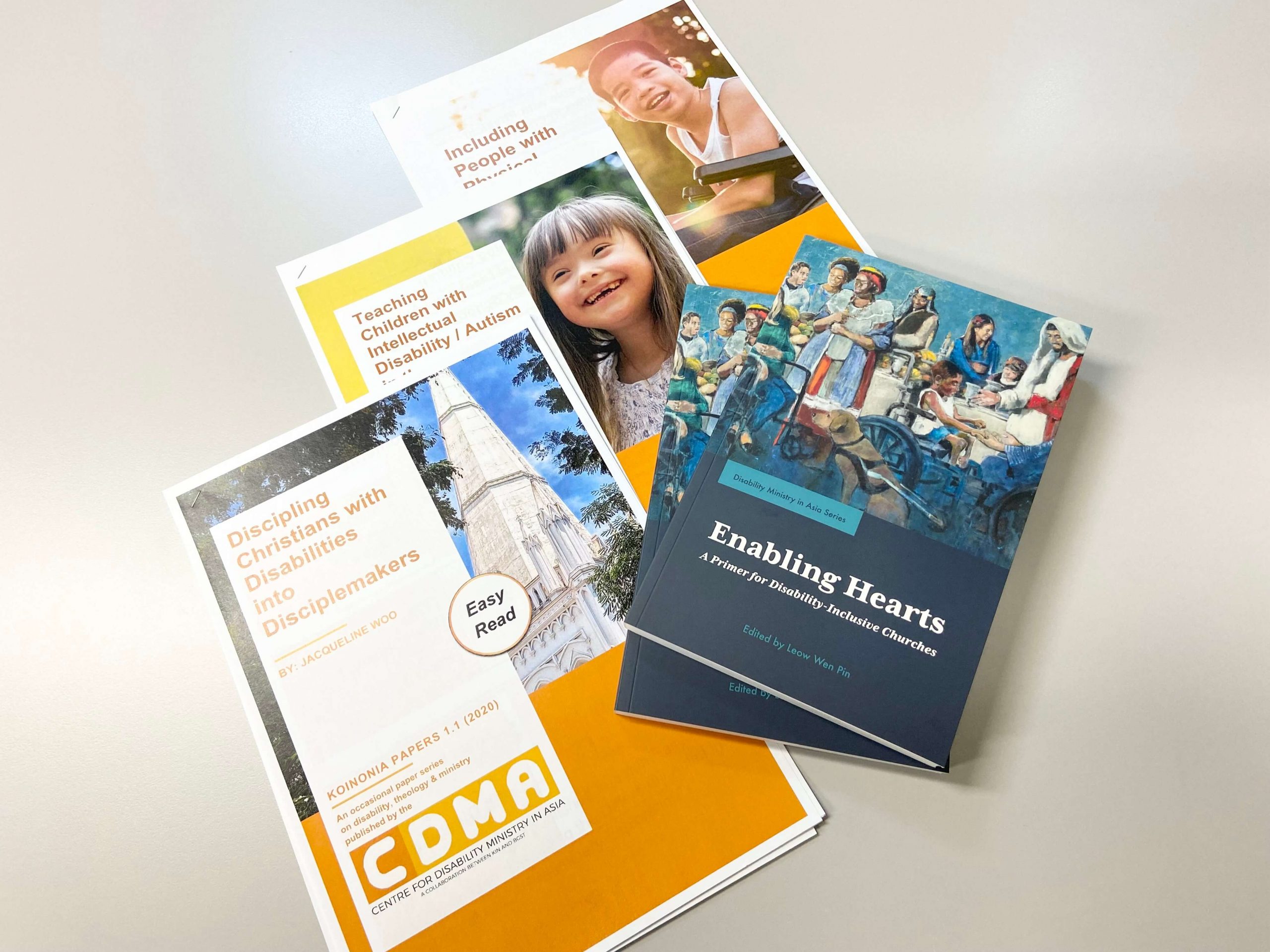
Resources produced by KIN’s Centre for Disability Ministry in Asia, including locally-written handbook, Enabling Hearts: A Primer for Disability-Inclusive Churches. Photo courtesy of Leow Wen Pin.
Apart from these two main pillars of training and research, Leow added that KIN is also working on developing one on missions, which will promote missions work undertaken by and for people with disabilities.
Equally broken
Leow’s heart for people with disabilities had not always been this instinctive, he shared with Salt&Light. Instead, it grew after interacting with some of them more closely.
In 2013, after he left his job as an educator to begin his journey into full-time ministry, Leow asked God which group in society he should serve next.
“Persons with disabilities do not disable the Church. Instead, they enable the Church to be what God wants His Church to be.”
“In particular, I asked Him to show me the last, the lost and the least. I knew that I needed to serve a group of people because that’s what being a Christian is all about. But the question is, which group?” he said.
Shortly after this prayer he received a call inviting him to join the school management committee in AWWA School, a school for children with moderate to severe disabilities. Taking it as an answered prayer, he agreed.
As he encountered and observed these children daily, he found that he was actually not too different from them. In particular, he realised that he, too, is “broken” like they are, albeit in different ways.
But while he can hide his brokenness, as many of us often do, they cannot.
“They wear their brokenness on their bodies,” said Leow, who was the school supervisor of the school management committee from 2014 to 2020.
“People with disabilities reveal to us who we truly are. We’re so adept at building up a false narrative for ourselves as a society that we’re independent.
“But God didn’t design us for independence. God designed us to be interdependent, and so people with disabilities simply remind us of that day in and day out,” he said.
“We’re so adept at building up a false narrative for ourselves as a society that we’re independent.”
Deciding to put his experience at AWWA School to good use, Leow read up more on disability and ran a course on it at BGST. Its first iteration was attended by 25 students who were invested in advocating for people with disabilities.
Through them, as well as his second batch of students when he repeated the course the following year, Leow learnt more about what God was already doing on the ground.
“He was helping his people be passionate about people with disabilities. There was a lot of ground swell and disability ministries were coming up,” he said.
However, he also noticed that, while people were eager to include people with special needs, many were either unsure of what exactly to do or lacked the necessary resources.
And so, out of that need, KIN was birthed.
The Gospel lived out
When asked how well churches in Singapore are doing in terms of being disability-inclusive, Leow noted that, to KIN’s knowledge, only about 5% – or approximately 25 Protestant churches out of 500 – currently have a disability ministry.
“If we look at this number and ask, is this what we want? I think the answer is no,” said Leow, who also helped to pioneer Kindle Garden, Singapore’s first fully inclusive preschool.
“We always think that to include people with special needs, we need special training. But what we need is a special love.”
However, he was quick to clarify that the ultimate goal is not merely to have more disability ministries or fully inclusive services, good as these things may be.
Noting that there are a broad range of disabilities, he acknowledged that it is unrealistic to expect a church to always have the expertise and logistics to accommodate a person with disability the moment they walk in.
But what is more important, he said, is having an attitude and culture of acceptance and service.
“Even if there are barriers, physical or otherwise, the person with special needs must be confident that, when they voice their needs, the church will have the deep desire, passion and drive to make changes to include them,” he said.
To Leow, this attitude of love is far more powerful than any expertise in disability that a church can build.
“We always think that to include people with special needs, we need special training. But what we need is a special love – God’s love. As long as the church has that, it will naturally become inclusive,” he said.
“Do we believe the Gospel is simply a truth to be believed in, or do we understand the Gospel as a truth to be lived out?”
This is why he believes that building a truly inclusive church – which accepts not just people with disabilities but all who are marginalised in society – starts at the pulpit.
There needs to be proper biblical preaching and teaching of the Word, which states clearly that believers are to love one another through actions (1 John 3:18), he said.
Like Jesus who emptied Himself to become a servant and die on the cross for us, the Church, too, must embody the same kind of sacrificial love for one another (John 13:34), he added.
“At the heart of it, do we believe the Gospel is simply a truth to be believed in, or do we understand the Gospel as a truth to be lived out?” he asked.
“When you realise what the Gospel is about and what is at stake, you do whatever it takes to love and welcome others. If it’s a person with disability, you do what it takes. If it’s a guest worker, you do what it takes. If it’s a sex worker, you do what it takes.”
Loving like Jesus
And as the Church learns to embrace those who are differently abled, challenging as it may be, it grows deeper in its understanding of how to love like Jesus did, said Leow.
“What’s best for us in God’s eyes is not coming to a church service and enjoying it because it’s so convenient. What’s best for us is when we sacrifice for one another in love. Comfort is fleeting. But knowing the Lord? That’s profoundly valuable,” he said.
From his own experience, accepting and doing life with people with disabilities has also opened up rich opportunities to receive love from them (1 Corinthians 12:24-25) in ways that have been formative in his own spiritual journey.
“When you realise what the Gospel is about and what is at stake, you do whatever it takes to love and welcome others.”
Leow, who is married to an ophthalmologist, recounted the time he first came to Singapore Life Church, after hearing a call to serve in the church. He had just uprooted his three young kids from their previous church and was conflicted over whether he had made the right choice.
At the family’s first church camp, while waiting to board the coach, Leow worried if his children would be lonely as newcomers.
Just then, a little boy named Ezra took his eldest son’s hand and pulled him up the bus.
“Ezra has Down Syndrome. And as I see them playing during the whole trip, laughing, making a lot of noise as boys do, I’m sitting there trying not to cry,” recalled Leow.
“I don’t know what led this young man with Down Syndrome to do that, but I knew that this specific incident was to drive home the message that God is there with us and that he would take care of my family,” he said.
At the very heart of the matter, embracing people with disabilities is simply extending spiritual friendship, something that is innately valuable to all of us as human beings, said Leow.
“The reason why the Church can do this uniquely is because it has a profound theology in the Gospel that drives it,” he said. “It is us saying, I look at you as another child of God. I see you through my Father’s eyes. And I welcome you into the family that our Father has created for us.”
That’s simply all it means to be family, to be kin.
Due to strong demand for KIN’s services from local churches, KIN is growing its staff team to meet those needs. To explore being a ministry partner with KIN, please write to [email protected] or go to https://www.kin.org.sg/giving/ to learn more.
FOR MORE STORIES ON KIN’S WORK, READ:
How do Sunday Schools meaningfully include children with special needs?
How do we enable differently abled persons to be full participants in the community of faith?
We are an independent, non-profit organisation that relies on the generosity of our readers, such as yourself, to continue serving the kingdom. Every dollar donated goes directly back into our editorial coverage.
Would you consider partnering with us in our kingdom work by supporting us financially, either as a one-off donation, or a recurring pledge?
Support Salt&Light